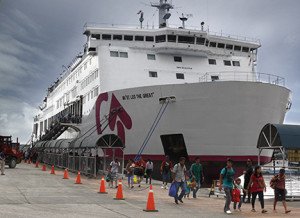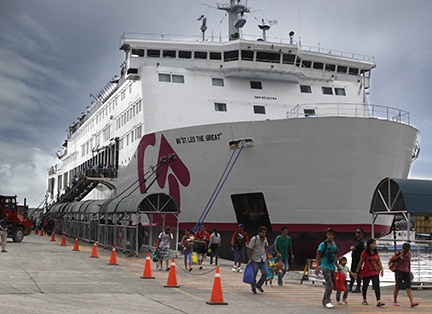 Prohibitive policies that hinder open competition in the Philippines might be the reason for the weak state of the domestic shipping industry, according to the World Bank.
Prohibitive policies that hinder open competition in the Philippines might be the reason for the weak state of the domestic shipping industry, according to the World Bank.
“Being an archipelago, the Philippines requires an efficient water transport system,” the World Bank’s Philippine Economic Update January 2015 stated.
“However, this is presently not the case. The domestic maritime industry is characterized by high costs, low quality of service, and a poor safety record,” the multilateral financial institution pointed out.
It cited the latest United Nations Conference on Trade and Development liner shipping connectivity index which ranked the Philippines 66th out of 157 countries in 2013, making it the worst performer among a group of East Asian competitors.
It also noted that the country’s logistics cost accounts for 24% to 53% of wholesale price, while shipping and port handling costs represent around 8% (to as high as 30%) of wholesale price depending on the goods and routes, and 5% of retail price. This, the World Bank said, makes Philippine domestic shipping generally more expensive compared with Malaysia and Indonesia—two other East Asian archipelagos.
Among the probable causes of the weak state of the country’s domestic maritime industry are “policies that hinder more open competition, including competition from more efficient foreign shipping companies,” World Bank said.
Philippine logistics cost accounts for 24% to 53% of wholesale price, while shipping and port handling costs represent around 8% (to as high as 30%) of wholesale price depending on the goods and routes, and 5% of retail price — World Bank
A 2014 World Bank study, “Enhancing Competition Conditions and Competitiveness of Philippine Domestic Shipping Services,” identified some of these restrictive policies as licensing restrictions, prohibition on foreign dry docking, prohibitive taxes, conflict of interest in port fee structure, and lack of maritime data.
Restrictive measures
Until recently, any firm wishing to operate a commercial domestic shipping service in the Philippines must first obtain a Certificate of Public Convenience (CPC). Incumbent players are given advance notice on the entry of new firms, and “often, incumbents argue that the market is too small to accommodate an additional player or that new entry would not be financially viable.”
At the very least, the World Bank said the regulation allows incumbents to use the CPC process to delay the entry of a new competitor, add to its start-up cost, and even block its entry.
Current regulations on dry docking require domestic vessels to dry dock and undergo repair in domestic shipyards, unless it applies for an exemption. The report said this policy not only reduces the level of competition among shipyards, but also increases the costs of domestic shipping operators. Dry docking outside the country can be up to 70% cheaper for large vessels, and will still be cheaper even if transportation costs are factored in.
Taxes also play a major consideration. In 2012, the government clarified that firms chartering vessels need to pay VAT and tariff on the value of the vessel when the previous practice was to exempt the chartering of vessels from these taxes. This makes vessel chartering for short periods very costly.
Moreover, the World Bank said there is a conflict of interest in the port fee structure. “The Philippine Ports Authority (PPA) is the regulator of port charges but it also earns 10 percent of domestic cargo handling rates and 20 percent of foreign cargo handing rates that private port operators collect. This creates a potential conflict of interest,” it stated.
Information on vessel operations, such as route traffic, cargo flows and passenger services, is difficult to obtain. “The lack of market information often functions as a barrier to entry since incumbents have more information on market opportunities,” the World Bank said.
Removing competition constraints and enhancing competitiveness of shipping companies can lead to greater efficiency, increased capacity, better quality of ships, lower operating costs, and lower freight rates, it added.
“In the absence of regulatory barriers, the threat of entry is very real. It can be an effective means to discipline the market as the stakes for incumbent operators are very high,” it added.
Regulatory revisions
To improve the quality of shipping services, the Department of Transportation and Communications (DOTC), Maritime Industry Authority, and PPA are implementing a five-pronged reform program to foster greater competition and competitiveness in the sector, the report said.
The proposed regulatory reforms primarily require executive actions, mostly within the ambit of the DOTC.
The World Bank said the following reforms are underway:
- Removing the opportunity for incumbents to object to the granting of a CPC
- Removing the requirement to dry dock and repair domestic ships exclusively in the Philippines
- Facilitating chartering of foreign vessels to operate in domestic routes by clarifying their tax liability
- Replacing PPA share of cargo handling fees with a fixed rate to reduce conflict of interest
- Providing more information on cargo flows and passenger services to the public to better inform potential entrants
The first reform was already completed in March 2014, when MARINA enacted new regulations that streamlined the procedural requirements in applying for CPCs and limited the ability of incumbent firms to delay their issuance by eliminating the requirement to inform incumbents of new market entry. This, the World Bank said, has cut average processing time for CPC issuances from 40 to 20 days, as most applications are no longer contested.
At the same time, a “special processing window/express lane” program was created to further shorten the processing time for CPC issuances to within nine days for particular types of vessel importations. By halving processing time, vessels can be deployed quicker, resulting in up to US$300,000 in additional revenues.
However, the United Nations institution said domestic shipping reforms only address part of the weaknesses of the domestic maritime sector.
“Complementary reforms to liberalize cabotage and improve port efficiency are also needed,” it said, adding that while the domestic reform program may help lower shipping costs for certain cargo types or routes, inter-island shipping costs will likely remain high due to constraints in port infrastructure and cabotage restrictions that prevent more efficient foreign ships from servicing domestic routes. – Roumina Pablo
Photo courtesy of Manila North Harbor Port, Inc





